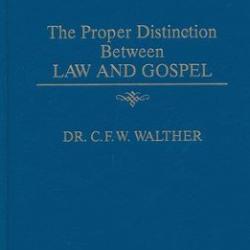I’ve followed the writings of Mark Jones on Reformation 21 since he began writing on the site this past year, and spent time reading his book Antinomianism: Reformed Theology’s Unwelcome Guest? I’ve also listened to several interviews that Jones has done on his book in response to what he perceives to be a contemporary trend of antinomianism. As I’ve followed his thoughts on this topic, it has become apparent that Jones has overreacted to a real problem, and in doing so, fails to distinguish between the two kinds of righteousness.
Antinomianism is a real issue in the church, and I appreciate that Jones has attempted to address it. There are some problematic movements in the church regarding the denial of the third use of the law, and the conflation of justification and sanctification. I have spent a good deal of time interacting with Gerhard Forde, Steve Paulson, and others who are guilty of reductionistic approaches to law and gospel which negate the reality of the law’s third use. However, in rejecting antinomianism, Jones has unfortunately still failed to distinguish the two kinds of righteousness, though in a different manner than antinomians do.
Jones’ fundamental theological flaw is his failure to distinguish between coram Deo and coram mundo righteousness. The problem is not that Jones emphasizes the goodness of the law, or the necessity of the good works in the Christian life. These contentions are correct. The problem is that Jones often places good works in the coram Deo category, and in doing so conflates passive and active righteousness. For example, Jones states that good works are a “necessary means of our salvation” (Antinomianism [Kindle], 1352). He adamantly defends the proposition “good works are necessary for salvation,” which is condemned in the Formula of Concord. For Jones, a rejection of such phraseology is tantamount to antinomianism. In doing so, Jones (perhaps unknowingly) condemns the Lutheran church as fundamentally antinomian. Jones also further argues that good works are not simply the “way of life” for the Christian, but are actually the “way to life” (Antinomianism, 1316). In doing this, Jones utilizes coram mundo language in relation to one’s coram Deo relationship. To be clear, Jones does confess justification by faith alone, and is quick to clarify such statements in light of that. However, this confusing language still places good works in an unnecessary place in Christian soteriology, and thus confuses a clear proclamation of sola fide.
There are two further issues in Jones’ work which demonstrate, again, why the distinction between the two kinds of righteousness is so essential. One of Jones’ contentions is that God’s love differs depending upon the progress of one’s sanctification. He writes: “God cannot help but love us more and more if we become more and more like him” (Antinomianism, 1617). This is held in contradistinction to Luther’s argument that: “The love of God does not find, but creates, that which is pleasing to it. The love of man comes into being through that which is pleasing to it” (LW 31, 57). For Luther, God’s love precedes all goodness in man and is not affected by man’s sanctification. Rather, sanctification is a result of the preceding perfect love that God has for the human creature. Jones does not deny that God’s love precedes human love either, but distinguishes between various kinds of love, and thus argues that God’s amor complacentiae vel amicitiae (love of delight or friendship) is dependent upon human performance (Antinomianism, 1578). This, again, is a confusion of language which bases one’s coram Deo relationship upon one’s coram mundo performance. This is further demonstrated by the fact that Jones contends, throughout the book, that assurance is to be found, not in the universal means of grace, but in one’s inner renewal. He argues: “The examination of our justification by our sanctification, is not only a lawful, and possible, but a very excellent and necessary work and duty” (Antinomianism, 2027).[1]
Jones thus encourages Christians to examine the state of their sanctification for assurance of their justification. One’s works coram mundo become the basis for assurance that the coram Deo relationship is intact. He puts this in a syllogism, writing: “Major Premise: Those who keep God’s commandments love Christ. Minor Premise: By the grace of God, I keep God’s commandments. Conclusion: I love Christ” (Kindle: 1905). Though good works certainly are a necessary result of saving faith, placing assurance in one’s sanctification points one inward, often leading to despair due to the lac of desired fruit in the Christian life.
Ultimately, Jones has the wrong answer to a real problem. For Jones, the only way in which to battle antinomianism is to place active righteousness language within the context of passive righteousness. This leads to a rejection of the law-gospel distinction. Jones argues: “When a sharp distinction is maintained between the law and the gospel in the Christian life, the first use of the law tends to replace the third use of the law as its primary function. Despite claims to the contrary, the law takes on a decidedly negative tone in the preaching and writing of those who hold to such a sharp distinction” (Antinomianism, 2277). Jones’ claim here is simply mistaken. The law does not necessarily take a purely “negative tone” for those who hold to a strong law-gospel distinction. This confusion stems from Jones’ failure to understand the two kinds of righteousness. One can boldly proclaim the goodness and necessity of the law while still holding firmly to the law-gospel distinction, so long as one sharply distinguishes coram Deo from coram mundo righteousness. With this distinction in mind, one can argue strongly against antinomianism, while just as strongly rejecting phrases like “good works are necessary for salvation,” and “good works are a means of salvation.” This distinction also assures that ones assurance is always placed in the passive, rather than active, righteousness category. So long as Jones fails to distinguish these categories, I fear that this type of theology will only lead people to despair and thus create more antinomians.
Jones’ book can be purchased here.
[1] This comes from a citation of John Flavel.












